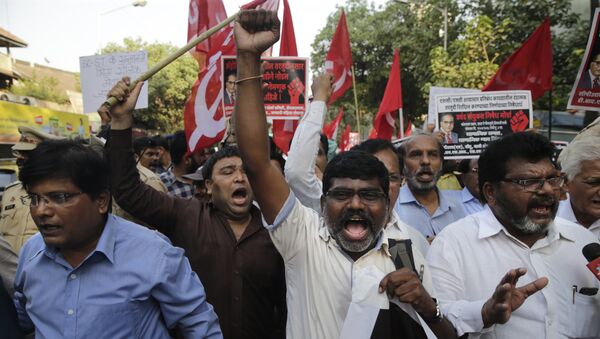New Delhi (Sputnik): Thousands of people belonging to India's lower castes took to the streets across the country on Monday against the apex court's order that seeks to dilute provisions of the Scheduled Castes and the Scheduled Tribes (Prevention of Atrocities) Act, which protects marginalized communities against discrimination and atrocities.
#WATCH: Members of different Dalit organisations stage road blockade and rail roko in different parts of #Odisha #BharatBandh pic.twitter.com/2vxHHdfTcC
— OTV (@otvnews) April 2, 2018
Sporadic clashes were reported between the protestors and the police. According to official figures, at least seven persons were killed and hundreds of others were injured during the clashes, mainly in central and northern parts of the country. Four persons were killed in the central state of Madhya Pradesh and one in each of the states Bihar, Rajasthan and Uttar Pradesh. The central government deployed eight companies (each company comprising 90-100 men) of the anti-riot rapid action force (RAF) to Uttar Pradesh and Madhya Pradesh to bring the situation under control. In Bhind of Madhya Pradesh, the Indian Army had to intervene to contain the situation from turning into a riot.
#WATCH #BharatBandh over SC/ST protection act: Clash between protesters and Police in Ranchi. Several people injured #Jharkhand pic.twitter.com/nYc19J6oUu
— ANI (@ANI) 2 апреля 2018 г.
#WATCH #BharatBandh over SC/ST protection act:Shots fired during protests in Madhya Pradesh's Gwalior pic.twitter.com/p8mW36qL0s
— ANI (@ANI) 2 апреля 2018 г.
#WATCH #BharatBandh over SC/ST protection act: Protesters thrashed by Police personnel in Meerut pic.twitter.com/yQfaJBDbBD
— ANI UP (@ANINewsUP) April 2, 2018
"We have sought more force from the Centre. We are keeping an eye on the situation," Director-General of Police, Uttar Pradesh, OP Singh, told the local press.
Educational institutions were closed and commercial activities were severely affected across the country. Communication and transportation, including train services, were disrupted across northern and eastern India, mainly in Madhya Pradesh, Rajasthan, Haryana, Uttar Pradesh, Punjab, Bihar and Jharkhand.
Massive violence in #Alwar during Bharat band call. Dozens of vehicle, police station torched, Railway tracks damaged. Govt fail to handle, Army called up. pic.twitter.com/GdZWsVZZDV
— Narendra singh (@jnarendra_singh) April 2, 2018
WATCH: Protesters resort to stone pelting in Bhind during #BharatBandh over the SC/ST Protection Act. #MadhyaPradesh pic.twitter.com/40KmhV3Ckm
— ANI (@ANI) April 2, 2018
On March 20, the Supreme Court of India passed a judgment which bars the immediate arrest of individuals accused of atrocities against lower caste people under the SC/ST (Prevention of Atrocities) Act, 1989. The judgment held that the prior sanction of an appointing authority is required for prosecuting officers who deal with complaints under the Act in their official capacity.
"…no arrest may be effected, if an accused person is a public servant, without written permission of the appointing authority and if such a person is not a public servant, without written permission of the Senior Superintendent of Police of the District," the judgment stated.
"There is no absolute bar against grant of anticipatory bail in cases under the Atrocities Act if no prima facie case is made out or where on judicial scrutiny the complaint is found to be prima facie mala fide." It further reads.
People are clueless about atrocities act!None of the protesters know what this is all about!opposition and Mevani is busy in politicising the entire issue!Govt has already filed a petition without wasting any time but no one is telling them to end this stupidity! #BharatBandh pic.twitter.com/L7FpxQQj8u
— Nisha (@niissh) April 2, 2018
The lower castes, collectively known as Dalits, fear the order would further weaken the law which is already poorly enforced, with abysmally low conviction rates. They also fear that such steps may eventually affect the reservations for lower castes in jobs across sectors.
The lower castes comprise over a quarter of India's total population and they often face discrimination by those identified as the upper castes in the ancient caste hierarchy system. Last Thursday, a group of people belongs to the upper caste had allegedly beaten to death to a lower caste youth for owning and riding a horse in the western state of Gujarat.
Meanwhile, the Narendra Modi government filed a petition before the Supreme Court on Monday seeking review of the controversial judgment that has sparked the protests.
The central govt was not a party in the case on SC/ST Protection Act & it does not agree with the reasoning given by SC in the judgement. The govt has therefore filed a comprehensive review petition. Modi govt & BJP is fully committed to the welfare of SC/STs: Shri @rsprasad pic.twitter.com/TfLQeBwsUu
— BJP (@BJP4India) April 2, 2018




